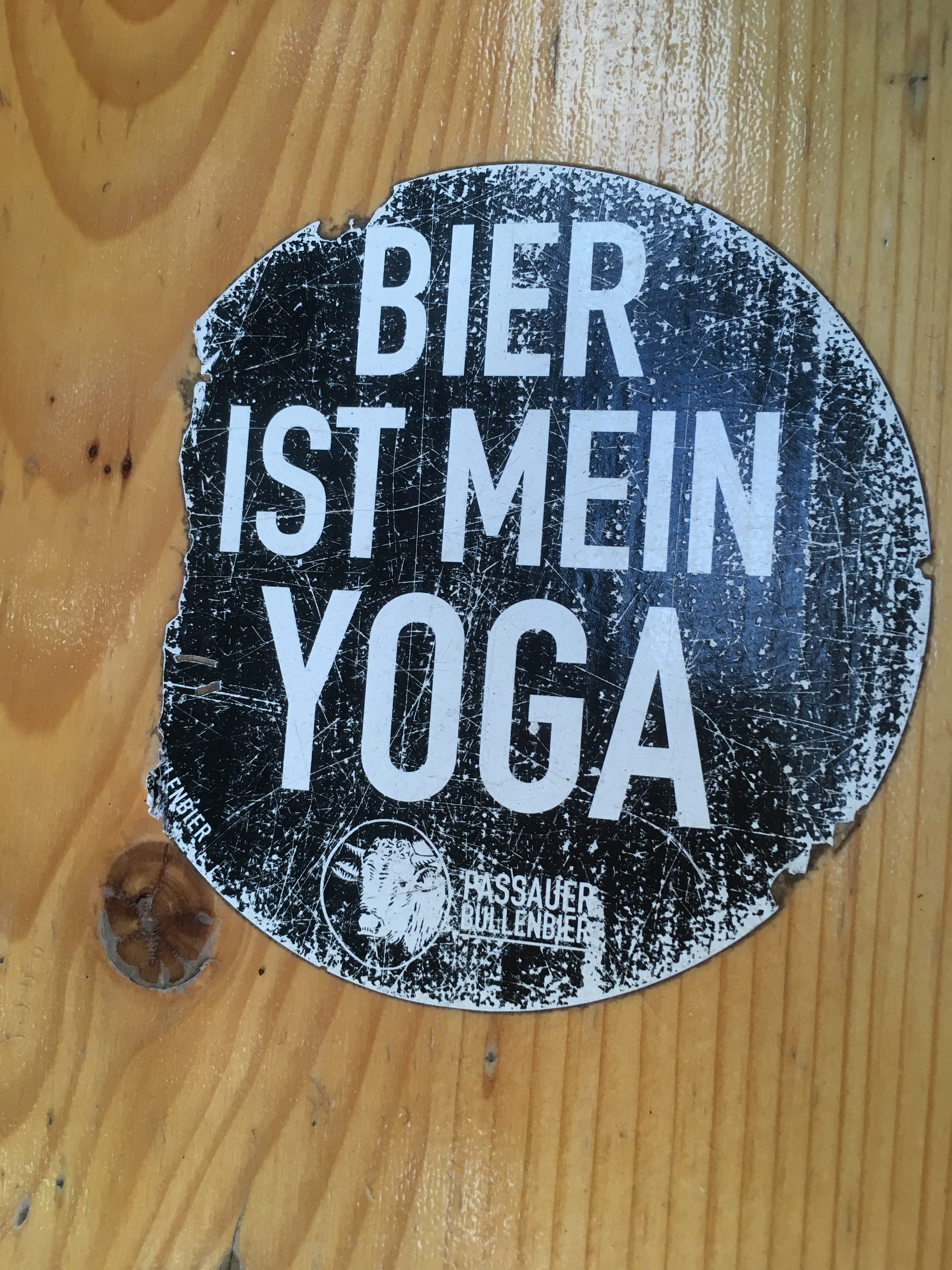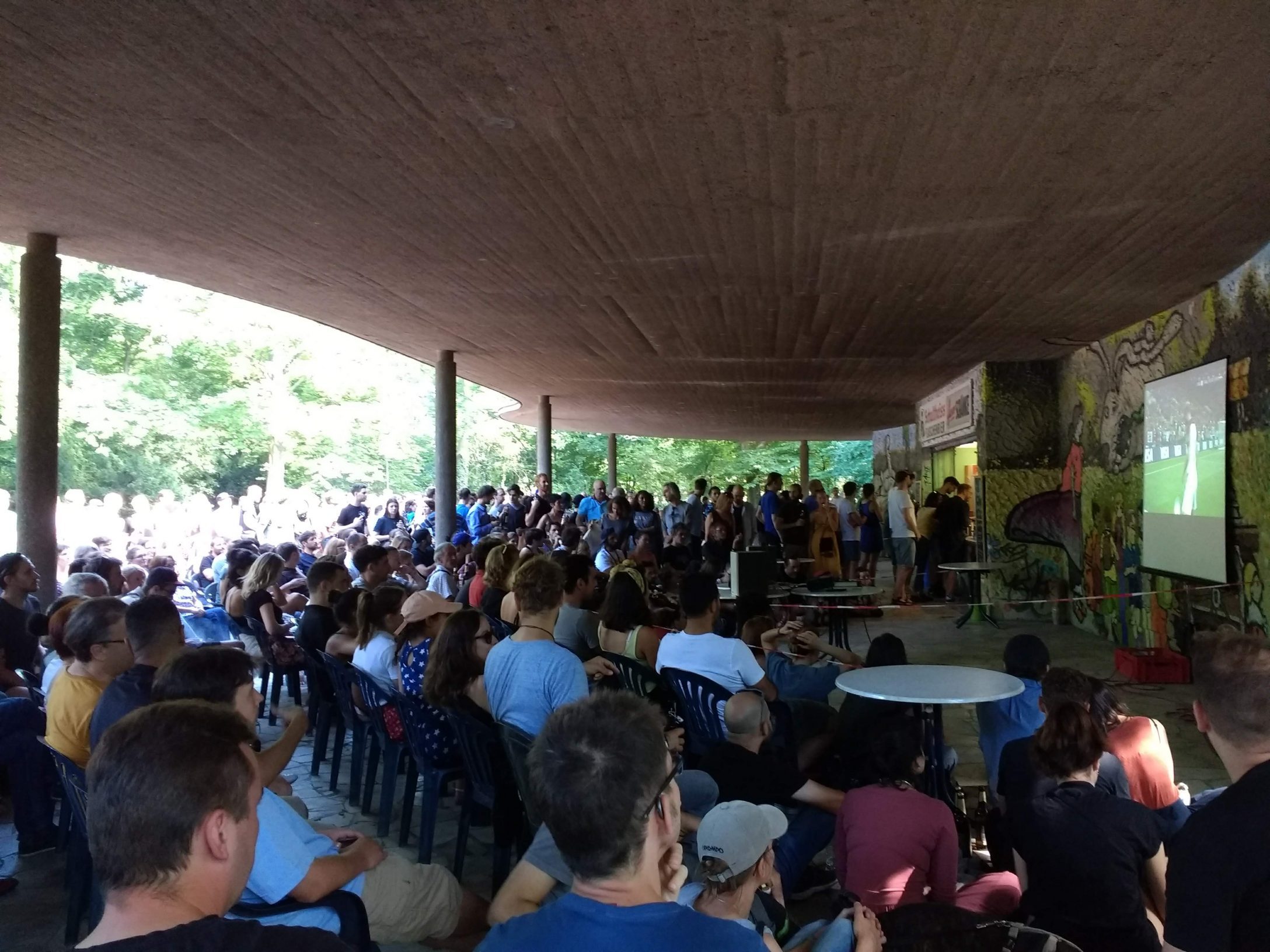5 PM. Juan Caballero. Hasenheide Café. Berlin, Germany.
Germany is a very orderly place, and its Permit Patties don’t even have to call the Polizei to harsh the mellows of their neighbors—they have a whole separate administrative force whose dispatchers send street agents when a sidewalk café’s chairs block the thoroughfare, or when a family is suspected of littering in a public park, or when noise ordinance limits are exceeded. This agency, the hilariously titled Ordnungsamt (Office of Order), imposes all kinds of order at the metropolitan level, uniting the authorities that in much of the world live in disparate, almost toothless offices like that of the Fire Marshall, Subway Security, or Code Enforcement. They are unarmed but have extensive fining authority, to such an extent that the daily life of any urban German includes a legitimate fear of being slapped with a huge fine for failing to enforce spatial norms to the letter of the law.
Much of the German-speaking world is seen from outside as one giant Ordnungsamt (or if you ask a Brexit proponent, the Ordnungsamt of Europe), but the paradox of quotidian life here is that if you color within the lines, it can be a very tolerant place, with skinnydippers in the ponds of city parks, Schnappsleiche (“Liquor-corpses”) passed out at busstops in the middle of the day, and massive multi-story punk squats that survive for decades a few blocks away from the headquarters of international banks. Germans know Berlin as a city of factory workers and ruthless, no-nonsense businessmen, home to a healthy working class culture that brought us Rosa Luxemberg and Käthe Kollwitz, where public spaces are often rowdy and cold beer is easier to find (and cheaper) than drinking water. Densely-built parts of Berlin have pub-like bars on every corner, but they also house a high portion of Spätis (short for Spätkaufen, late-night liquor stores) outside of which it is common to sit and empty an open container legally, on milk crates or on wooden benches or on long picnic tables, depending on how much side the Ordnungsamt regulations allow the business to occupy. It speaks volumes about the football culture of Germany that minor games are rarely shown at bars or restaurants, but always shown at the neighborhood Spätis, whose owners often bring a television outside for major games and even rent extra seating. They are the sites of many a neighborhood skirmish between Ordnung and Football.
I chose not to watch the final at a Späti (or on my laptop, since no apps or services are required to stream the World Cup here) because it was screening at 5pm, on a very sunny Sunday. I am staying near a lot of massive, well-maintained green spaces that I knew would be bustling, so I watched it at the Freiluftkino (Germans love outdoor film projections) housed at an old-fashioned concession stand/café that offers a rare outcropping of concrete in a massive wooded park that features prominently both in the canonical nineteenth century novel Effi Briest and in mid-2000’s debates about how to police low-level street drugs in the pre-gentrification South side of the city.
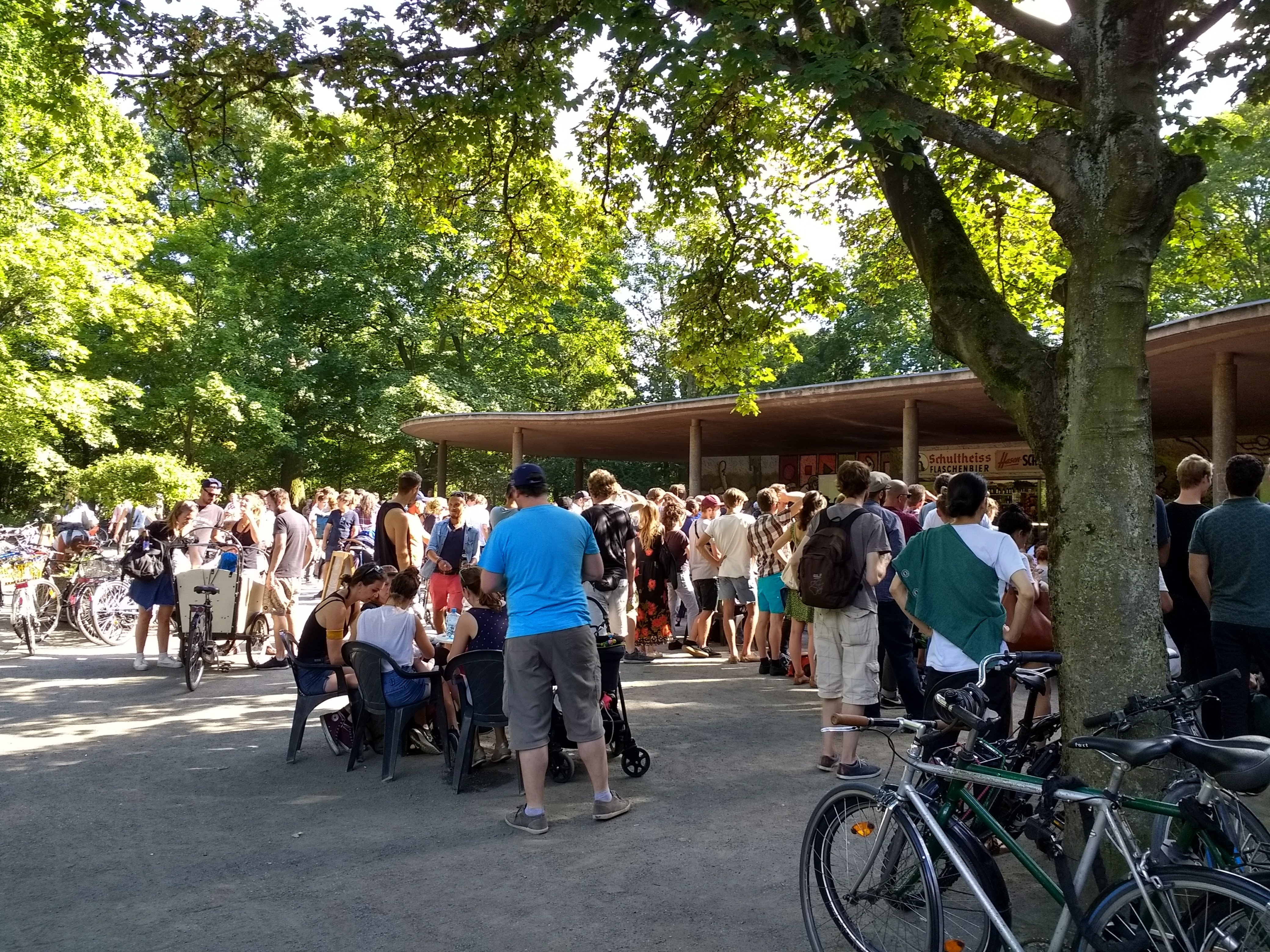
Other World Cup games I’d seen here (on weekdays) had been seated by loyalty, each team’s loyalists and a smattering of neutrals clustering around a projector on either side of the concession stand. Today, Croatian sympathizers seemed the majority but the pro-France contingent seemed scattered throughout, and unlike prior games no one was wearing colors or flags of either team. It was a polyglot crowd, maybe half of which lived within walking distance but biked anyways, with the usual quotient of dogs and smokers (it’s nominally an outdoor space). The mood was sundrenched and forgiving, with the dire shortage of seating leading to surprisingly little friction, and the relatively high quotient of English spoken being tolerated a little more than usual. Specific people to whom I paid attention by dint of proximity and volume seemed to cheer and clap equally for both sides’ goals and impressive near-misses (it was a jerky game full of surprises, after all). At no point was the line for beer less than 20 people the entire game and halftime—the only real shouting was from the manager, trying to clear an alley for egress after people had gotten their beers.
Perhaps the real fanatics were watching on bigger screens with quieter crowds elsewhere, but the tone was relaxed and warm for a sporting event, much less for a World Cup final. Because the majority seemed to be low-key rooting for the underdogs, the most excited the crowd seemed to get was after Croatia’s first goal, which sustained a certain neck-to-neck tension until the second French goal (and concomitant shift in the tone of France’s handling). It may have been a World Cup final, but it was also a very sunny Sunday after a grey and rainy week, way too sunny to get bent out of shape or harsh anyone’s mellow. It was nice to see this many people peaceably sharing such a small space and so many beers, even if my team didn’t win against their seasoned all-star Goliath. Most of the crowd seemed to drift off without lingering to discuss the game much, as there were still an hour or two of quality sun left, and too much shade under that concrete slab. Alles in Ordnung.
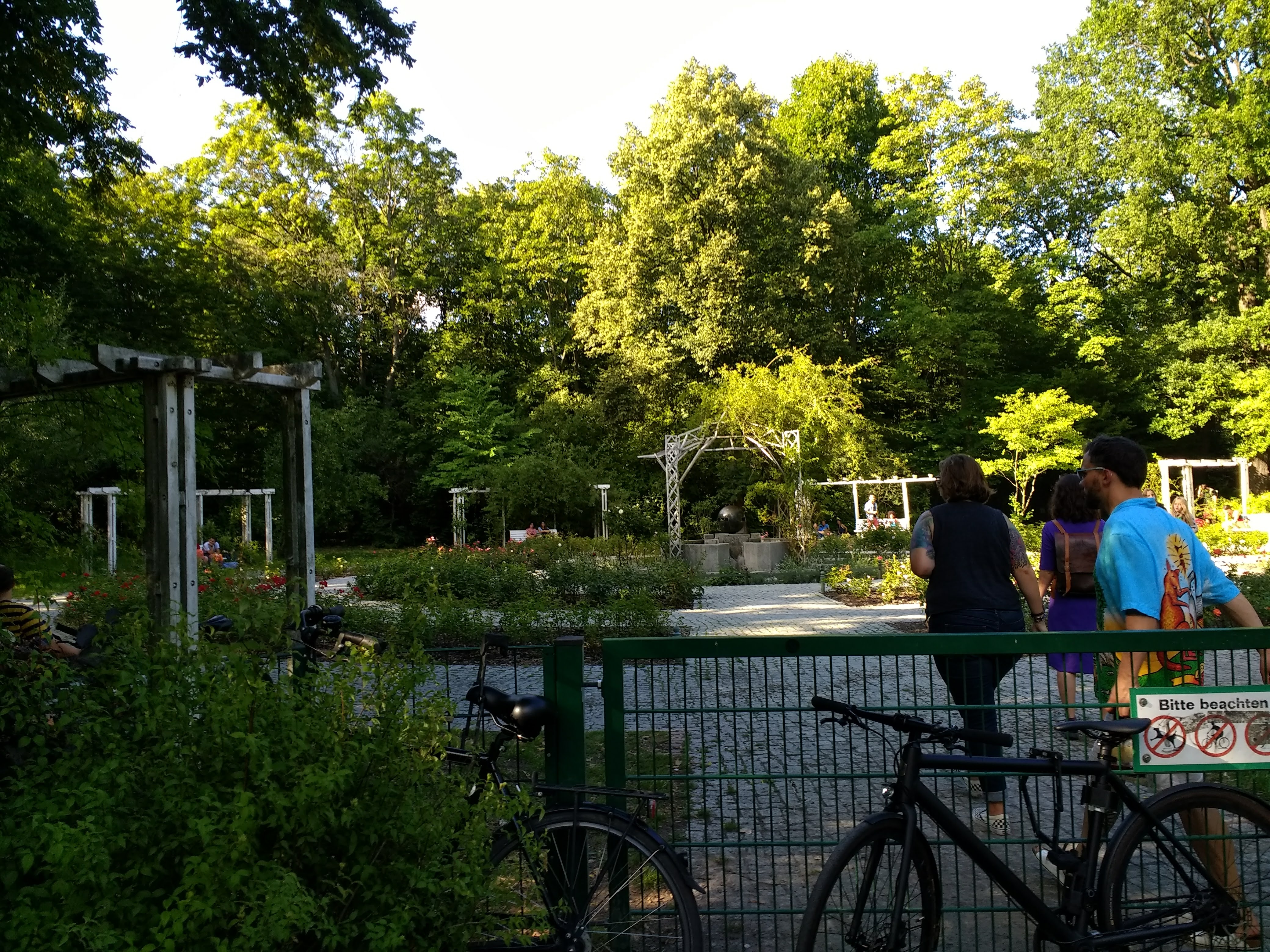
***
8pm, Allison Burtch. A Spätkauf. Berlin, Germany.
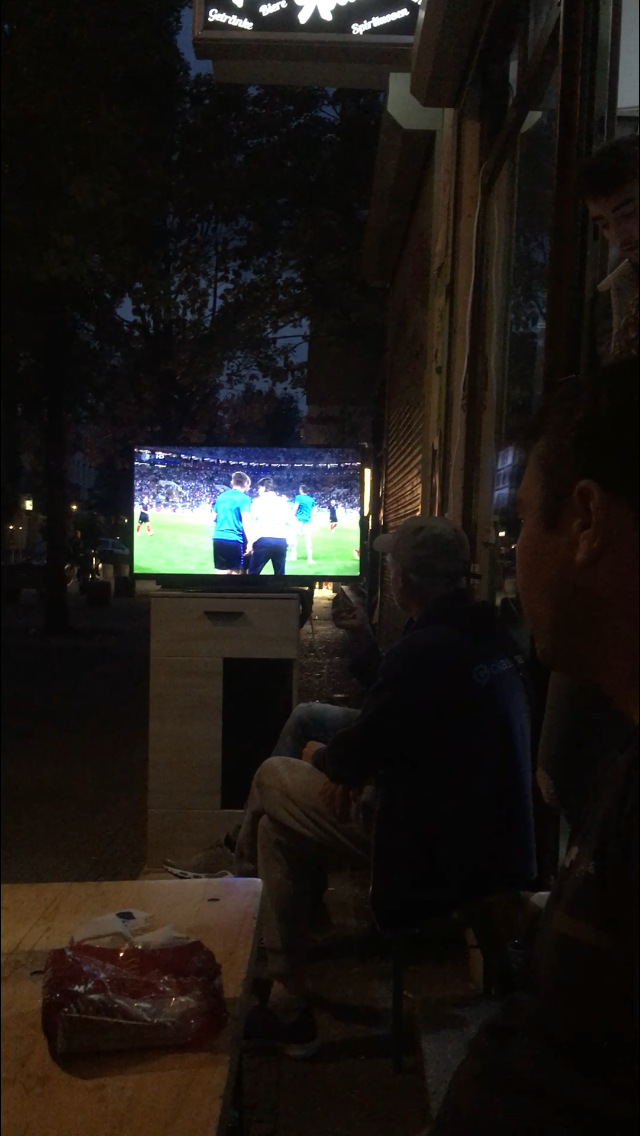
I watched the finals today, in a private home, on a private television, but I prefer a memory from four days ago, when I was drinking outside. I watched Croatia play England in front of a späti in East Berlin with a bunch of German communists I met on the internet. In New York, you have a bodega, in Montreal, a dépanneur, in England, an “offie,” but in East Berlin, you get your beer and watch the World Cup at a Spätkauf. The Spätkauf, or Späti—pronounced shpaeti—means ‘open late’ and is a uniquely East Berlin holdout, a GDR creation for shift-workers to get goods outside normal working hours. For the Cup, seemingly every Späti puts out a table and a TV. You drink the beer you buy outside and grab food wherever they sell it. My table had a sticker on it that said “bier ist mein yoga.”
My cohort for the evening was my three roommates: Albert, Daniela and Urs. Daniela, being Bosnian, didn’t want Croatia to win because her uncle, an avowed racist, really wanted Croatia to win. I felt generally anti-English but not necessarily pro-Croatian. We sat next to a Romanian and a couple of other old men at the table in front of the Späti. My English friend showed up, and Daniela’s allegiances shifted back to Croatia. By the end of the game, there were around twenty people standing around this small screen. On this block, and the next, and the next, you could see small tables, medium screens, large crowds, and a lot of beer. It started to rain. The woman who owned this späti had her son come out to fix the TV. The small crowd remained and the rain subsided.
The World Cup is often described as some sort of great equalizer, a rare opportunity for humanity to do something together. It is rare that we can all experience something collectively, or, more specifically, it’s rarer that we are aware that we are doing so. That night, as we got progressively drunker and ate “Mexican” nachos, we saw Croatia win. I felt grateful that the world had provided such decent people, that they would offer me a place to stay, that we could talk about our interconnections, and that they might invite me back again.
